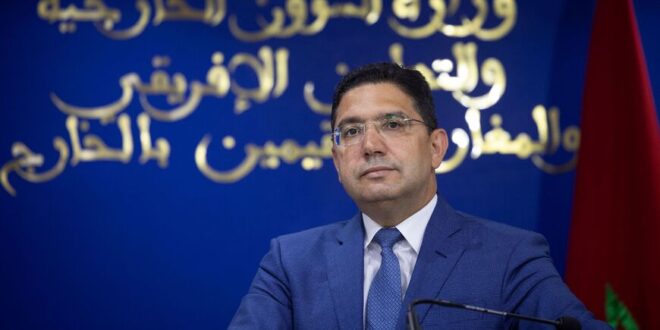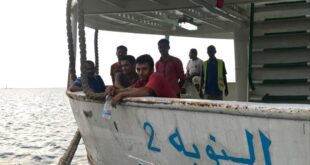Morocco and Ethiopia ramping up cooperation in various fields as negotiations remain stalled over the Grand Ethiopian Renaissance Dam and Egypt refuses to back Morocco on the Western Sahara issue.
Speaking at the United Nations Climate Action Summit in New York Sept. 25, Moroccan Foreign Minister Nasser Bourita announced that Morocco and Ethiopia had created a Coalition for Sustainable Energy Access. He said the cooperative project is part of Morocco’s efforts to support sustainable development, access to energy and resource development in Africa.
On Sept. 19, the Moroccan state-owned OCP Group, one of the world’s largest phosphate mining and leading global fertilizer firms, signed an agreement with the Ethiopian government to establish a fertilizer complex at a cost of $6 billion in the eastern Ethiopian city of Dire Dawa.
The Ethiopian News Agency reported that the project will help meet Ethiopia’s growing needs by producing up to 3.8 million tons of fertilizers per year.
The Ethiopian-Moroccan cooperation comes amid the stalled negotiations between Egypt, Sudan and Ethiopia over the Grand Ethiopian Renaissance Dam.
In the aftermath of the announcement, several Arab countries and other parties reaffirmed their support for Egypt in the GERD crisis.
On Sept. 27, Bahraini Foreign Minister Abdul Latif bin Rashid al-Zayani once again called for a fair and binding agreement to fill and operate the dam that preserves the rights of both Egypt and Sudan.
On Sept. 26, Saudi Ambassador to Cairo Osama bin Ahmed Naqli reiterated his country’s support for both Egypt and Sudan in the GERD crisis. He said in a statement, “Saudi Arabia supports Egypt and Sudan in their quest for an agreement that achieves the interests of the two brotherly countries in all international forums.”
On Sept. 23, Secretary-General of the Arab League Ahmed Aboul Gheit had announced the league’s support for Egypt and Sudan in the GERD crisis, which he dubbed as a “dam of ruin” for the two Arab countries.
Samir Ghattas, head of the Middle East Forum for Strategic Studies, told Al-Monitor that Morocco’s rapprochement with Ethiopia comes as part of the kingdom’s efforts to mobilize support from new parties in its battle against its “greatest enemy,” the Algerian-backed Polisario Front, which seeks the independence of the disputed Western Sahara territory.
On Sept. 27, Algeria’s Foreign Minister Ramtane Lamamra called on the United Nations to support the right of the “Sahrawi people to self-determination,” a claim Morocco strongly rejects.
On Sept. 15, the Moroccan Barlamane news site cited sources as saying that in the coming weeks, Ethiopia will open diplomatic offices in Laayoune, the largest city in the disputed Western Sahara. The move, according to the sources, will support Morocco’s sovereignty over the disputed region.
Ghattas said that Morocco is also seeking cooperation with Ethiopia in light of the Egyptian-Algerian rapprochement and after Algeria announced its willingness to serve as a mediator in the GERD crisis.
On Sept. 27, Egyptian Minister of Foreign Affairs Sameh Shoukry said in statements on the sidelines of the United Nations General Assembly summit in New York that Egyptian-Algerian relations are of great importance to Egypt and that Cairo is looking forward to continuing cooperation and bilateral coordination both in the Arab League and the African Union.
On Sept. 17, Egypt’s Ambassador to Algeria Ayman Mosharafa said that the two countries had agreed to reactivate the Egyptian-Algerian Joint Higher Committee with a view to promoting economic cooperation early next year.
On Aug. 31, Shoukry had said that Egypt enjoys a special relationship with Algeria as the two share much the same vision for their countries.
On Aug. 1, Lamamra visited Egypt after stopping in Sudan and Ethiopia as part of a regional tour to find a solution to the GERD crisis.
Ghattas called Moroccan-Egyptian relations “lukewarm” in the wake of Egypt’s refusal to support Morocco against the Polisario Front while many Arab countries were quick to declare solidarity with Morocco on the Western Sahara issue.
With the outbreak of violence between the Polisario Front and Morocco in November last year, Arab countries rushed to declare their support for Morocco. On Nov. 13, 2020, the UAE announced its support for Morocco’s actions to defend its lands and Saudi Arabia followed suit the next day.
Jordan, Kuwait, Yemen, Bahrain and Qatar voiced their full support for the sovereignty and territorial integrity of Morocco and said the kingdom should take the measures it deems appropriate to protect its lands.
However, Egypt refused to support the kingdom in its war against the Polisario Front and has expressed no support for the Moroccan army in confronting it. On Nov. 15, Cairo called on the parties to exercise restraint and stop any provocative actions that could jeopardize the economic interests of the region. Morocco harshly criticized Egypt for its position.
Anwar Ibrahim, a researcher in Ethiopian affairs, told Al-Monitor that the heightened tensions between Morocco and Algeria that culminated in the latter cutting ties with its neighbor and the Egyptian-Algerian rapprochement prompted Morocco to seek a foothold inside Ethiopia to secure its support while creating opportunities for expansion in East Africa.
On Aug. 24, Algeria severed diplomatic relations with Morocco and withdrew its ambassador from Rabat.
Ibrahim said that the Moroccan agreements with Ethiopia will give Rabat a strong economic presence there through Moroccan investors and create new investment opportunities in Ethiopia, especially after the GERD beings to generate electricity.
On Sept. 10, Ethiopian Minister of Water and Irrigation Seleshi Bekele said the dam will begin generating electricity during the first months of the new Ethiopian year, which started on Sept. 13.
 Eurasia Press & News
Eurasia Press & News



